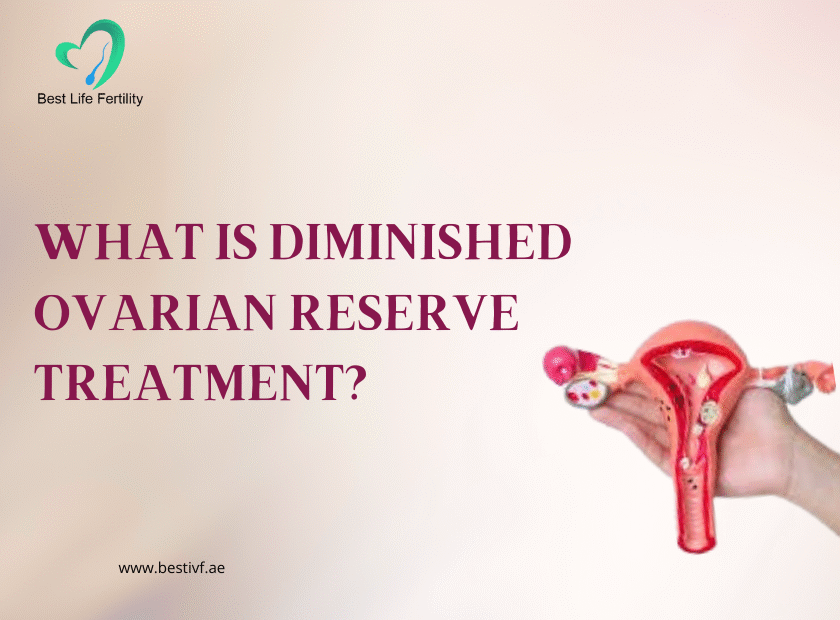What is Diminished Ovarian Reserve Treatment?
Summary
Diminished ovarian reserve (DOR) is a condition where a woman’s ovaries lose egg quality and quantity earlier than expected, leading to difficulties with natural conception. This article explains the causes, symptoms, diagnostic methods, and advanced diminished ovarian reserve treatment in Dubai. It also highlights lifestyle measures, assisted reproductive options, and the importance of expert guidance to help women understand and manage this condition with clarity and hope.
Fertility depends largely on ovarian health, and one common issue that many women face is diminished ovarian reserve (DOR). This condition can cause emotional stress and affect family planning decisions, often discovered only after difficulties in conceiving. Early awareness, timely diagnosis, and effective treatment play a crucial role in improving chances of pregnancy. Thanks to modern medicine, advanced fertility treatments in Dubai provide women with new hope and personalized solutions.
What is Diminished Ovarian Reserve?
Diminished ovarian reserve means the ovaries have fewer eggs than expected for a woman’s age or the eggs are of lower quality. Although it is natural for egg reserve to decline over time, in some women, this reduction happens much earlier, leading to fertility challenges.
Key points:
- Reduced egg quantity: Fewer eggs available for ovulation.
- Egg quality issues: Eggs may not fertilize or develop into healthy embryos.
- Fertility impact: Reduced chance of natural conception.
Causes of Diminished Ovarian Reserve
Several factors contribute to this condition:
- Age-related decline (more common after mid-30s).
- Genetic conditions like Turner syndrome.
- Medical treatments such as chemotherapy or pelvic surgery.
- Autoimmune disorders where the immune system attacks ovarian tissue.
- Lifestyle factors including smoking and exposure to toxins.
Unknown causes in otherwise healthy women.
Symptoms and Signs
Often, women do not realize they have diminished ovarian reserve until they try to conceive. Some common signs include:
- Short menstrual cycles (less than 26 days).
- Irregular or missed periods.
- Difficulty conceiving after regular attempts.
- Low Anti-Müllerian Hormone (AMH) levels.
- High Follicle-Stimulating Hormone (FSH) levels.
Diagnosis of Diminished Ovarian Reserve
Doctors use different tests to evaluate ovarian health:
- AMH Test – Measures Anti-Müllerian Hormone, an indicator of egg count.
- FSH and Estradiol Test – High FSH levels may mean reduced egg reserve.
- Antral Follicle Count (AFC) – Ultrasound scan to count egg-containing follicles.
- Ovarian Volume Scan – Measures the size of ovaries to estimate reserve.
Early testing helps specialists suggest the right fertility plan.
Treatment Options for Diminished Ovarian Reserve
1. Lifestyle and Supportive Measures
- Eating a nutrient-rich diet.
- Maintaining healthy weight.
- Reducing alcohol and quitting smoking.
- Supplements like CoQ10 and DHEA (with medical guidance).
2. Fertility Medications
- Ovarian stimulation injections to encourage egg growth.
- Medications to improve egg response during IVF.
3. Assisted Reproductive Techniques (ART)
- IVF (In Vitro Fertilization): Eggs are collected, fertilized in a lab, and embryos transferred to the uterus.
- ICSI (Intracytoplasmic Sperm Injection): Single sperm injected directly into an egg.
- Egg Freezing: Preserves fertility for future use.
- Donor Eggs: For women with very low egg reserve.
4. Advanced Options in Dubai
Dubai fertility centers offer:
- Personalized ovarian stimulation.
- Embryo genetic screening (PGT-A).
- Cryopreservation with latest technology.
This makes diminished ovarian reserve treatment in Dubai a reliable option for women seeking tailored solutions.

Emotional and Psychological Support
Dealing with DOR can be emotionally draining. Anxiety, stress, and disappointment are common. Counseling, mindfulness practices, and support groups help women and couples feel emotionally supported during treatment.
The Role of Specialists
Fertility success depends greatly on the expertise of doctors. In Dubai, Dr. Mazen, widely known as the best fertility specialist in Dubai, offers patient-centered care with advanced techniques. His approach ensures that women receive not just treatment, but also emotional support and clear guidance at every stage.
Preventive Awareness
Although diminished ovarian reserve cannot always be prevented, awareness matters. Women who wish to delay pregnancy should consider fertility tests and egg freezing early, ensuring better reproductive choices in the future.
FAQs
- Can women with diminished ovarian reserve get pregnant naturally?
Yes, some women still conceive naturally, but chances may be lower. Early medical guidance is important. - Is diminished ovarian reserve the same as infertility?
No, it doesn’t mean infertility. It means lower egg count and quality, but treatments like IVF can help. - What is the success rate of treatment in Dubai?
Success depends on age, egg quality, and treatment choice. Dubai offers advanced IVF and donor egg programs with high success rates. - When should I get tested for ovarian reserve?
If you’re over 30 and planning to delay pregnancy, or if you’ve been trying for a year without success, testing is recommended.
Diminished ovarian reserve is a medical condition, but it does not mean the end of fertility possibilities. With early diagnosis, modern treatments, and emotional support, many women achieve successful pregnancies. Clinics like Best Life Fertility Clinic in Dubai ,the best fertility clinic in dubai offer comprehensive care that combines advanced reproductive medicine with patient-centered guidance, helping women navigate their fertility journey with confidence.
Understanding Medical Terms
- Ovarian Reserve: The number of eggs left in a woman’s ovaries.
- AMH (Anti-Müllerian Hormone): A hormone that shows how many eggs are available.
- FSH (Follicle-Stimulating Hormone): A hormone that helps eggs grow; high levels mean fewer eggs left.
- IVF (In Vitro Fertilization): Collecting eggs and fertilizing them outside the body.
- ICSI: A single sperm is placed inside an egg to help it fertilize.
- PGT-A: A test done on embryos to check if they are healthy before placing them in the uterus.



